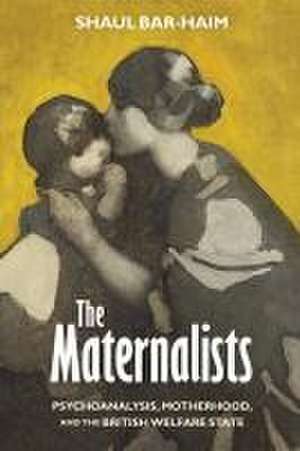The Maternalists – Psychoanalysis, Motherhood, and the British Welfare State: Intellectual History of the Modern Age
Autor Shaul Bar–haimen Limba Engleză Paperback – 27 mai 2024
After the First World War, British doctors, social thinkers, educators, and policy makers became increasingly interested in the contemporary turn being made in psychoanalytic theory toward the role of motherhood in child development. These public figures used new notions of the "maternal" to criticize modern European culture, and especially its patriarchal domestic structure. This strand of thought was pioneered by figures who were well placed to disseminate their ideas into the higher echelons of British culture, education, and medical care. Figures such as the anthropologists Bronislaw Malinowski and Geza R heim, and the psychiatrist Ian Suttie--to mention only a few of the "maternalists" discussed in the book--used psychoanalytic vocabulary to promote both imagined perceptions of motherhood and their idea of the "real" essence of the "maternal." In the 1930s, as European fascism took hold, the "maternal" became a cultural discourse of both collective social anxieties and fantasies, as well as a central concept in many strands of radical, and even utopian, political thinking. During the Second World War, and even more so in the postwar era, psychoanalysts such as D. W. Winnicott and Michael Balint responded to the horrors of the war by drawing on interwar maternalistic thought, making a demand to "maternalize" British society, and providing postwar Britain with a new political idiom for defining the welfare state as a project of collective care.
| Toate formatele și edițiile | Preț | Express |
|---|---|---|
| Paperback (1) | 198.00 lei 3-5 săpt. | +23.01 lei 4-10 zile |
| MT – University of Pennsylvania Press – 27 mai 2024 | 198.00 lei 3-5 săpt. | +23.01 lei 4-10 zile |
| Hardback (1) | 389.63 lei 3-5 săpt. | +26.20 lei 4-10 zile |
| MT – University of Pennsylvania Press – 5 aug 2021 | 389.63 lei 3-5 săpt. | +26.20 lei 4-10 zile |
Din seria Intellectual History of the Modern Age
-
 Preț: 185.35 lei
Preț: 185.35 lei -
 Preț: 243.50 lei
Preț: 243.50 lei -
 Preț: 330.24 lei
Preț: 330.24 lei - 11%
 Preț: 443.05 lei
Preț: 443.05 lei -
 Preț: 203.04 lei
Preț: 203.04 lei - 11%
 Preț: 474.94 lei
Preț: 474.94 lei - 11%
 Preț: 502.86 lei
Preț: 502.86 lei -
 Preț: 466.13 lei
Preț: 466.13 lei - 11%
 Preț: 441.89 lei
Preț: 441.89 lei - 11%
 Preț: 562.11 lei
Preț: 562.11 lei - 11%
 Preț: 624.77 lei
Preț: 624.77 lei -
 Preț: 464.00 lei
Preț: 464.00 lei -
 Preț: 313.45 lei
Preț: 313.45 lei - 23%
 Preț: 427.99 lei
Preț: 427.99 lei - 5%
 Preț: 426.73 lei
Preț: 426.73 lei - 9%
 Preț: 683.85 lei
Preț: 683.85 lei - 23%
 Preț: 526.63 lei
Preț: 526.63 lei - 23%
 Preț: 527.93 lei
Preț: 527.93 lei - 23%
 Preț: 524.72 lei
Preț: 524.72 lei - 23%
 Preț: 489.49 lei
Preț: 489.49 lei - 23%
 Preț: 427.99 lei
Preț: 427.99 lei - 23%
 Preț: 464.27 lei
Preț: 464.27 lei
Preț: 198.00 lei
Nou
Puncte Express: 297
Preț estimativ în valută:
37.89€ • 39.41$ • 31.28£
37.89€ • 39.41$ • 31.28£
Carte disponibilă
Livrare economică 25 martie-08 aprilie
Livrare express 08-14 martie pentru 32.100 lei
Preluare comenzi: 021 569.72.76
Specificații
ISBN-13: 9781512826050
ISBN-10: 1512826057
Pagini: 304
Dimensiuni: 152 x 229 x 15 mm
Greutate: 0.45 kg
Editura: MT – University of Pennsylvania Press
Seria Intellectual History of the Modern Age
ISBN-10: 1512826057
Pagini: 304
Dimensiuni: 152 x 229 x 15 mm
Greutate: 0.45 kg
Editura: MT – University of Pennsylvania Press
Seria Intellectual History of the Modern Age
Notă biografică
Cuprins
Introduction
Chapter 1. The "Sphincter-Morality" and Beyond: The Concept of Childhood in Interwar Psychoanalysis
Chapter 2. How Children Think: Susan Isaacs on "Primitive" Thinking
Chapter 3. Malinowski, Róheim, and the Maternal Shift in British Psychoanalysis and Anthropology
Chapter 4. Imagining the "Maternal" Past: Ian Suttie's Critique of Oedipal Culture
Chapter 5. What About Father? Civic-Republican Maternalism and the Welfare State
Chapter 6. "The Drug 'Doctor'": The Balint Movement and Psychosocial Medicine in Postwar Britain
Conclusion
Note
Bibliography
Index
Acknowledgments
Descriere
Descriere de la o altă ediție sau format:
The Maternalists explores how mid-twentieth-century British psychoanalysis created a new mother-centered culture, which after 1945 would shape dramatically both welfare ideology and the British welfare state itself.
The Maternalists explores how mid-twentieth-century British psychoanalysis created a new mother-centered culture, which after 1945 would shape dramatically both welfare ideology and the British welfare state itself.
